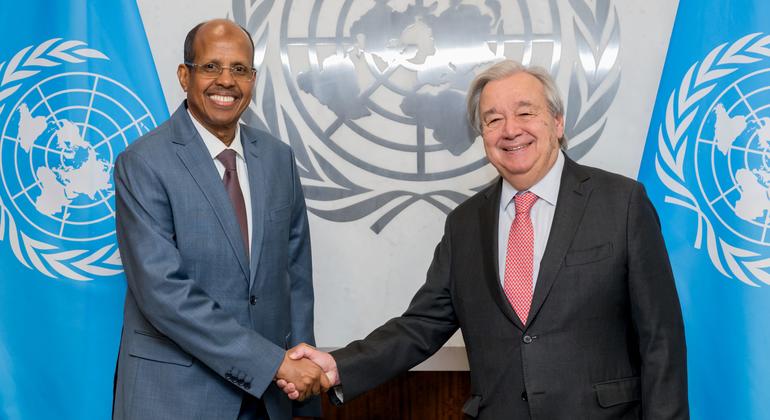António Guterres was speaking at UN Headquarters in New York following the ninth conference between the global body and the African Union (AU).
The high-level talks focused on progress in implementing cooperation frameworks but also on joint action and challenges in the areas of peace, security, development, human rights and climate action.
A necessary union
“Cooperation between our organizations has never been stronger — or more necessary,” the Secretary-General said at a press briefing alongside the Chairperson of the AU Commission, Mahmoud Ali Youssouf.
“Our world is in turmoil, rocked by deadly conflicts, widening inequalities, climate chaos and runaway technologies. The impacts are felt deeply on the African continent.”
Mr. Youssouf said the partners have aligned their respective development agendas.
Peace, climate justice and reform
They also are working closely on flagship peace programmes, including the AU’s efforts to ‘Silence the Guns’ by 2030, and are now “very much involved” in advancing climate justice and energy transition.
He also highlighted commitment to work with all parties and stakeholders at the UN on Security Council reform.
“These reforms are indeed of paramount importance and would ultimately consolidate the multilateral system,” he said.
The two organizations also face financial strains and “need to adapt our actions and programmes to the new realities.” They also must continue to support peace operations, the fight against terrorism, conflict prevention and resolution, and focus most of their efforts on humanitarian affairs.
Correcting injustice, ensuring fairness
The Secretary-General outlined three areas where decisive action is needed, starting with simply prioritizing Africa.
He noted that the Pact for the Future, adopted last year by Member States, also called for Africa to have permanent seats on the Security Council, “correcting once and for all an intolerable injustice faced by the African continent.”
His second point concerned financing for development and innovation. Although Africa has vast resources, “its progress is held back by an outdated and unfair global financial system,” he said.
“The time has come to reform this financial architecture – so it reflects the world of today and better serves the needs of developing countries, particularly in Africa.”
He recalled that “African leadership helped secure the Sevilla Commitment,” an agreement reached by Member States this year, which includes steps to advance issues such as easing debt burdens and lowering borrowing costs.
The Secretary-General will urge the G20 group of industrialized nations “to lead on these long-overdue reforms” when he attends their summit in Johannesburg, South Africa, later this month.
Invest in peace
Finally, turning to investing in peace, the UN chief reaffirmed his full support for the Silencing the Guns initiative.
“And its time is now,” he added. “Today, Africa is home to too many conflicts and too much suffering.”
On Sudan, he expressed grave concern over recent reports of mass atrocities and gross human rights violations in El Fasher and worsening violence in the Kordofans.
He also voiced alarm over rising insecurity in the Sahel, and highlighted other situations across the continent, including in Mali, South Sudan, Somalia, Libya and the Democratic Republic of the Congo (DRC).
“The world must not turn its back on Africa, home to nearly one-fifth of humanity,” the UN chief underlined, warning that “the stakes are too high. And the potential is too great.”



